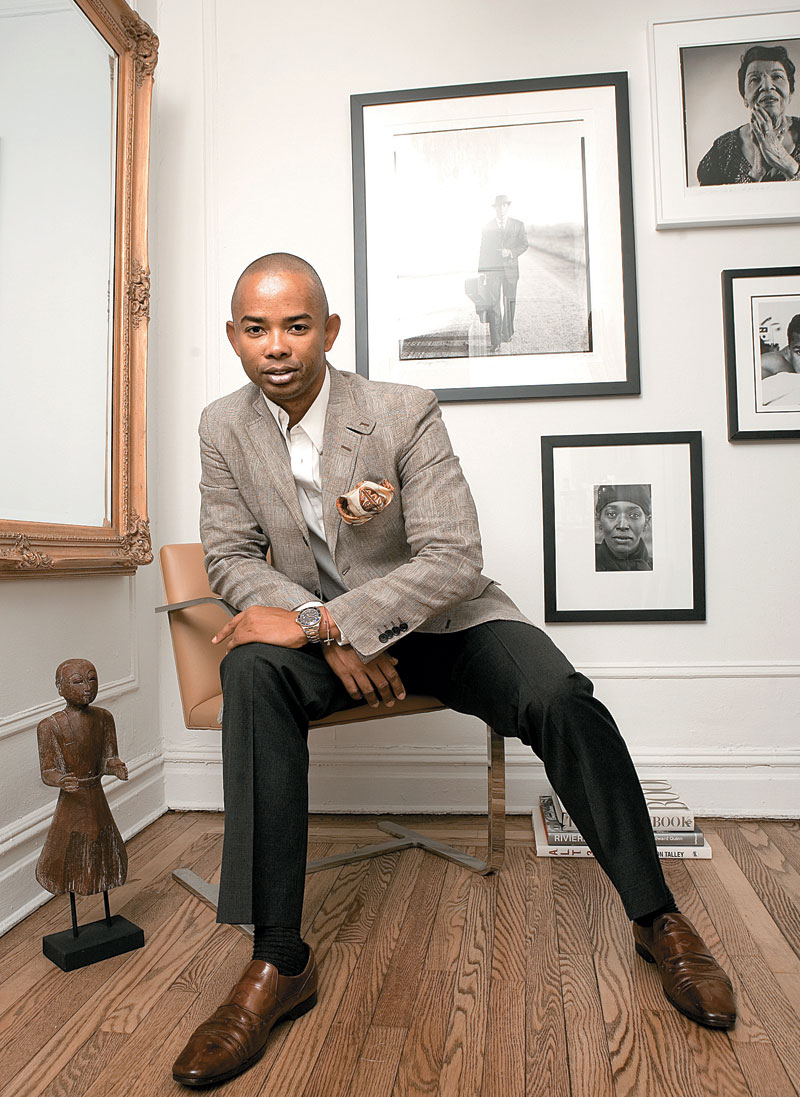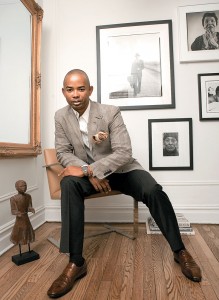
GOOD MORNING, P.O.U.!
We conclude our series on African-American Real Estate Moguls with…
SPENCER MEANS
(From The New York Times)
His Life Was Like a Novel, But Bad Guys Make Better Stories
By WARREN ST. JOHN
Published: August 1, 2004
LIKE many recent saucy novels about life in Manhattan, ”Gotham Diaries” — a book set in the city’s upper echelons of African-American society — has spun off a parlor game among readers seeking to link fictional characters to their real-life counterparts. Who among Manhattan’s black elite, for example, corresponds to Tandy, the desperate, cash-poor widow of a corporate lawyer; and who to Lauren, the ennui-riven documentary filmmaker and wife of a prominent black philanthropist?
While these remain tantalizing questions — which the authors Tonya Lewis Lee and Crystal McCrary Anthony are content to leave hanging — when it comes to Manny, the scheming, insecure, name-dropping Etro-clad gay black real estate broker from Alabama who is the novel’s chief villain — there is little doubt about who inspired the character.
”People say, ‘Who’s Tandy? Who’s Lauren? Who’s Manny?’ ” said Spencer Means, a Corcoran broker with a thick Southern drawl, a fondness for Etro and a list of prominent African-American clients. ”Since I’m one of a very few black gay Alabamians in real estate in New York, they say, ‘Well, that’s Spencer Means!’ ”
In fact, as the authors readily admit, it is Mr. Means, at least to a point. Exactly to what point, though, is a matter of some concern to Mr. Means’s friends and clients, who include Spike Lee (Tonya Lee’s husband) and Al Roker of ”The Today Show.” While the plot of ”Gotham Diaries” revolves around an elaborate real estate con perpetrated by Mr. Means’s fictional stand-in, they insist the real Mr. Means is as honest as the day is long.
”Here’s where they share commonalities,” Mr. Roker said. ”They are African-American. They are from the South. They are real estate brokers. And that’s where it ends. I’m adamant about that. Spencer wouldn’t be where he is today if he were Manny. And P.S., he wouldn’t be our friend. I wouldn’t have anybody like that in my house.”
If Mr. Means is the least bit concerned about being the inspiration for a literary cretin in a summer read, he is not letting on. Mr. Means volunteered to have his life pillaged for fiction by granting interviews to the authors about his life and career. For the better part of a decade, Mr. Means has served as the real estate broker of choice for many of New York City’s well-heeled African-Americans — he handled the sale of Mr. Lee’s town house in the Fort Greene section of Brooklyn, and helped find apartments for Ms. McCrary Anthony and her now estranged husband, Greg Anthony, the former point guard for the New York Knicks. As such, Mr. Means said, he figured his life was eminently novel-worthy.
”Being a broker, you become entwined in people’s lives,” he said as he paced through an empty town house in Harlem that he is trying to sell. ”Their guards are down. You know the intimate financial details in their lives. It’s a very powerful thing.”
In some ways, Mr. Means’s life has followed a novelistic arc, even without subplots of real estate schemes. He grew up in a relatively well-to-do black suburb of Birmingham in the 1960’s at the height of the civil rights struggle there. He lived down the block from A. G. Gaston, the black entrepreneur who bailed Martin Luther King Jr. out of the Birmingham jail. Though his father was a prominent real estate developer, Mr. Means said, when he tells New Yorkers that he is from Alabama, they inevitably assume ”I grew up with chickens in the front yard.”
When he graduated from high school, his parents offered him a choice of graduation gifts — ”the car or the cash,” he said — and he took the cash, $10,000, and promptly moved to New York, to live with a cousin, who soon died of AIDS. Mr. Means was a salesman at Tiffany’s at the time, and homesick. He had all but decided to head buy viagra new jersey back to the South, when on a snowy winter day, Lena Horne burst through the store’s revolving doors, snowflakes dusting the shoulders of her black mink coat, her wrists sparkling with bracelets of rubies and diamonds.
”Where are you from?” she asked Mr. Means, who had been assigned to help her.
”Alabama,” he said.
”Well, I bet you miss that home cooking,” Ms. Horne said.
When Mr. Means admitted that he was thinking of heading home for some of that cooking — and for good — Ms. Horne shot him a look.
”You stay here,” he said she told him. ”Because you’re going to be a star!”
Mr. Means got his real estate license and stayed in New York to see if Ms. Horne’s prediction would come true. He started by handling co-op conversions on the Upper West Side. His big break came in 1997, when a friend referred him to the Lees, who were selling their brownstone in Fort Greene to move into Manhattan. Like a number of Mr. Means’s clients, Mrs. Lee said she chose Mr. Means in part to support a fellow African-American. Mr. Means, she said, rearranged furniture and brought flowers to lighten the mood. At the time, Mr. Lee came under attack from some black neighbors who feared gentrification and the possible influx of whites. In short order, Mr. Means managed to attract a buyer who was willing to pay more than the asking price, and who was black, which, Mrs. Lee said, helped to ease tensions with the neighbors.
”Something I know how to do is close a deal,” Mr. Means said.
With buyers, Mr. Means takes a different approach. His M.O. is to take leisurely tours of Manhattan apartments punctuated by long lunches with clients to get to know them and their tastes. At midday he can usually be found in pinstripes and Gucci loafers entertaining clients at Cafe Luxembourg on the Upper West Side, at Balthazar in SoHo or Le Bilboquet on the East Side. Mr. Means said he chooses his restaurants in part because of their cocktail menus.
He doesn’t drink at lunchtime, he said, ”but my clients usually want one when they’ve seen the prices of Manhattan apartments.”
This approach has led to a curious bond between Mr. Means and his clients, some of whom have more or less adopted him once their real estate needs are met. He spends weekends with the Roker family on their farm in upstate New York, for example, and Mr. Roker said his children call Mr. Means ”Uncle Spencer.” He is a frequent guest at the Lees’ vacation home on Martha’s Vineyard, and last week accompanied Mrs. Lee and Ms. McCrary Anthony to Miami for a birthday party for the actor Vin Diesel.
”Spencer sort of becomes part of your lifestyle,” Mrs. Lee said.
From a novelist’s standpoint, Mr. Mean’s career as a real estate broker was a perfect literary trope for exploring the private worlds of a book’s characters. The authors warned him, somewhat ominously, that they would take artistic liberties with his life story, but Mr. Means — rarely one to say no to a client — was unconcerned.
”I thought it was a brilliant idea,” Mr. Means said. ”When they were writing, I told them they had full run of how they wanted to make the character.”
During the writing and editing process, Mrs. Lee said, she and Ms. McCrary Anthony repeatedly offered to show sections to Mr. Means, who always declined to read them. Though he has appeared at readings and signed an occasional autograph, Mr. Means said he had not read the entire book.
”I know the ending,” he said.
And as for people — especially potential clients — assuming he has the same moral make-up as Manny, Mr. Means said he was not worried.
”People realize it’s a fictional character,” he said. ”It’s like saying Joan Collins was Alexis Carrington on ‘Dynasty.’ ” Mr. Means paused. ”Maybe she was,” he said.

